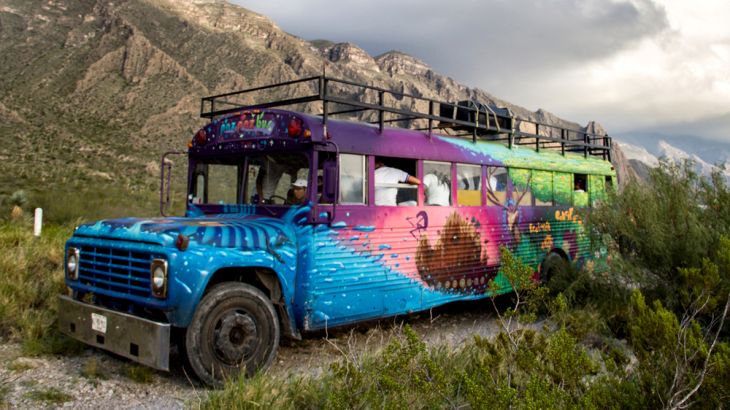
Paz Paz Bus
A bouncing bus full of inspiration and energy is taking a message of ecological awareness to rural Mexico.
Driving through the most remote regions of Mexico, the artists driving the “Paz Paz Bus” are working to transform the struggling rural communities in Mexico.
Their vehicle is an old school bus they have turned into a mobile laboratory. It combines the artists’s passion for art and their drive and desire to create sustainable solutions to growing ecological problems.
Keep reading
list of 4 itemsKing Charles unveils royal portrait
Cannes film festival hopes for ‘no controversies’ as wars, scandals rage
Energy summit seeks to curb cooking habits that kill millions every year
Liliana Riva Palacio and Enrique Lomnitz brought together these twin passions and their multidisciplinary expertise to inspire and empower rural communities in the responsible use of natural resources.
Together, their approach encompasses water conservation, energy efficiency, and cultural and social development, all from onboard their roaming caravan they call the “Paz Paz Bus”.
With great imagination, and encouraging free expression and creativity, they are working to implement solutions to overcoming the negative environmental impact affecting Mexico.

FILMMAKER’S VIEW
By Sergio Blanco Martin
The name given to the bus by its previous owners refers to the French word for the master key that will allow a person access to anywhere, and it fits perfectly for the holistic project started by its current owners, Liliana and Enrique.
| Sergio Blanco Martin | |
Sergio Blanco was born in Madrid, Spain. He studied Audiovisual Communication and majored in scriptwriting and Documentary Film Directing at the Madrid Film Institute. Blessed are Those Who Believe without Seeing , his thesis project, was shown at the Manaki Brothers International Cinematographers Film Festival in 2008. The following year, he moved to Mexico and co-wrote the documentary No place is far away (2012), directed by Michelle Ibaven with whom he is now preparing his first feature-length film as director.
|
By gathering an interdisciplinary group of technicians, artists and teachers aboard the Paz Paz Bus, the team strives to apply technology that will alleviate some of the basic factors of social inequality, like access to water and energy.
The transformation to which they hope to contribute begins by identifying community leaders who can share knowledge, the only way to ensure that the technology will remain intact and spread everywhere they visit.
For this reason, one of the main flashpoints for the film was to observe the human relationships that sustain and pave the way for eco-technological innovation.
The caravan uses alternative practices to challenge peoples’ imaginations and helps them to discover the possibilities of renewable resource use.
While it works to reduce environmental impacts, the Paz Paz Bus seeks to culturally enrich each community and show them ways to conquer marginalisation.
At the head of the project, we were able to identify leaders who, in addition to their sincere motivation, convey the kind of support that is vital for successful teamwork.
So, the crew’s enthusiastic conviction to give people quality attention and help get them access to basic services was the driving force for this trip to three different rural and urban communities where water scarcity is a general problem.
Committed to their life’s mission, the organisers aspire to take the Paz Paz Bus much further, especially now that they have created a ground-breaking model of transformation on wheels, operating in some of the country’s most urgent environmental challenges.
I would like to express my gratitude to Casa Verde Colectivo and their kind musicians that shared their wonderful song Amor for this project.

